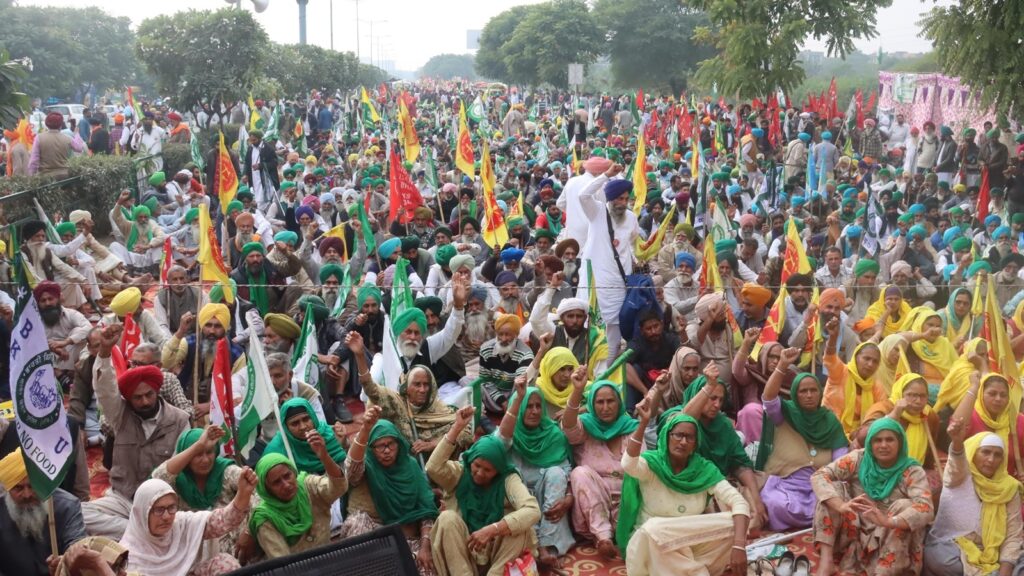With about a year and a half to go for the Punjab Assembly elections, a 2020-like protest is brewing in the state against the controversial land pooling policy, putting the ruling Aam Aadmi Party (AAP) on a sticky wicket.
The policy that was rolled out in June and hailed as the “future of urban development” has been criticised by farmers, the Opposition, and even some sections of the AAP. The policy aims to acquire over 65,000 acres of land from 164 villages for urban development projects and promises monetary compensation, commercial and residential plot returns, and long-term value appreciation.
While the Bhagwant Mann government has repeatedly stressed that the policy is voluntary and farmer-friendly, farmer organisations such as the Samyukta Kisan Morcha (SKM), SKM (Non-Political), and Kisan Mazdoor Morcha (KMM) have expressed concerns about it almost immediately after rollout.
The July 30 tractor march across all 164 affected villages has set the tone for what seems like a 2020-style protest. “Resistance is building across villages as people are becoming aware of the harmful effects. They have not yet started full-scale protests,” said SKM’s national coordination committee member Balbir Singh Rajewal.
The protest epicentre is Ludhiana, where the government has proposed to pool 40,000 acres of land, of which 20,000 acres have been earmarked for industrial areas. Here, people in the villages of Malak, Aligarh, Pona, and Agwar Gujaran (Jagraon) were among the first to put up boards declaring that AAP leaders were not welcome. They were soon joined by several others across the state. In some villages, AAP sarpanches are leading the protests while the party’s block presidents in Jodhan and Dakha in Ludhiana, and Kotkapura in Faridkot district have resigned in protest against the policy.
Some senior party leaders have also voiced their concern about the policy. On July 24, AAP’s Anandpur Sahib MP Malvinder Singh Kang urged his party to hold dialogue with farmer bodies to “win their trust before moving ahead”. He later deleted the post. The party’s Ropar MLA, Dinesh Chadha, told farmers of his constituency that “even an inch of land would not be acquired without their consent”.
Taking note of the growing dissent, the Mann government tweaked the policy on July 22. It increased the annual compensation from Rs 50,000 per acre to Rs 1 lakh with an annual hike of 10% and permitted farmers to cultivate the land till physical possession is taken, among other benefits.
However, demanding a complete rollback, farmers’ unions have rejected the changes, terming them “cosmetic”. “Mann must be reminded of our 2020 struggle against the farm laws. He wants to acquire our fertile land. We won in 2020 and we will win this fight too,” said Joginder Singh Ugrahan, president of the BKU (Urgahan).
What has seemingly cornered the AAP further is the Opposition’s united stand against the policy. Since the policy’s rollout, the Congress, Shiromani Akali Dal (SAD) and BJP have been organising rallies, dharnas and outreach campaigns at the district-level.
State Congress chief Amrinder Singh Raja Warring last week said if elected to power in 2027, the party would scrap the policy. Shiromani Akali Dal (SAD) president Sukhbir Singh Badal, while accusing the AAP of “hoodwinking farmers”, referred to the scheme as a “land-grabbing policy”. The BJP has called the policy “anti-farmer and deceitful” and promised to take the farmers’ concerns to Governor Gulab Chand Kataria, with state BJP chief Sunil Jakhar submitting a memorandum to him in this regard.
“While the BJP is not fully welcome in villages, at least we are not facing protests and that is a relief,” said a BJP leader, referring to the backlash that party leaders faced in the run-up to last year’s Lok Sabha polls.
Will AAP calibrate its stance?
Since the backlash in rural areas, which are seen as an AAP stronghold, the ruling party leadership has seemingly gone silent. While CM Mann, who hailed the policy as “remarkable”, has not spoken about it since the protests began, AAP national convenor Arvind Kejriwal also avoided the subject during his Punjab visit on July 31 and August 1. However, a day later, Mann said his government “will do what the people and farmers want”. “We are not dictators,” he added.
For the party, which swept rural Punjab in 2017, farmer distrust and seemingly waning support from the community are a big blow as fears of the party ceding space to the BJP mount. “The anger we had against the BJP in 2020, we feel it for AAP now. We are starting to regret bringing the AAP to power,” said Didar Singh Malak, a farmer in Malak village in Ludhiana district.
Sources in the housing and urban development department said the government was planning to “go slow” on the policy’s implementation. “Instead of aggressively rolling the policy out across the state, the government is likely to implement it in a few zones like Ludhiana, Mohali and Patiala,” a source said, adding a few realtors had consented to the acquisition of 300 acres in Ludhiana, 150 acres in Patiala, and 50 acres in Mohali.
Another source said successes in small clusters would be demonstrated before seeking broader farmer participation. Farmer unions, however, seem to be in no mood to relent and have decided to escalate the protests through a series of mahapanchayats. While the SKM (non-political) will hold a mahapanchayat in Ludhiana on August 7, the KMM and SKM will hold theirs on August 20 and 24, respectively. The KMM will also hold a statewide motorcycle march on August 11, while a permanent dharna by the Zameen Bachao Punjab Bachao Sangharsh Committee has been going on outside the Greater Ludhiana Area Development Authority (GLADA) office since July 20.

